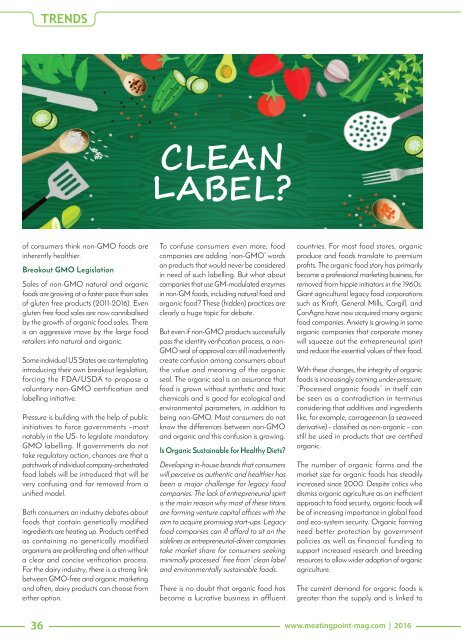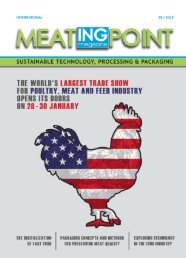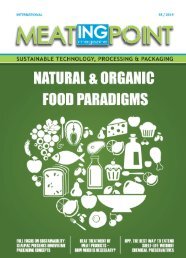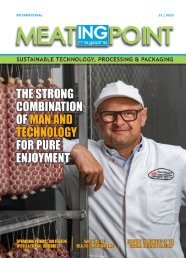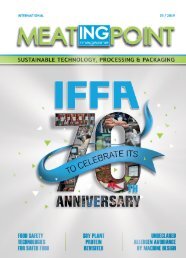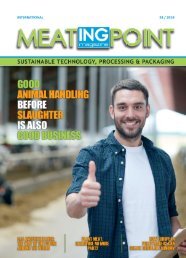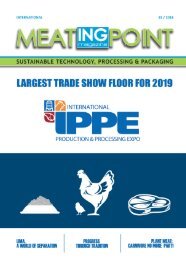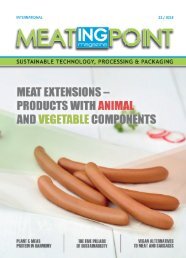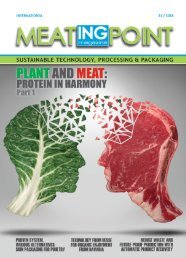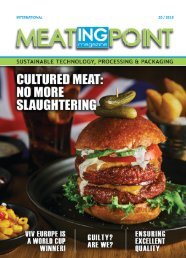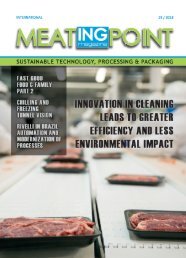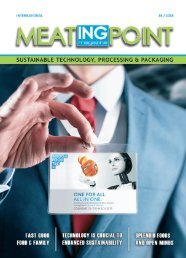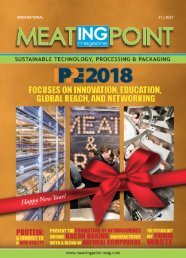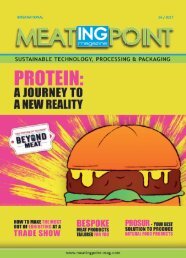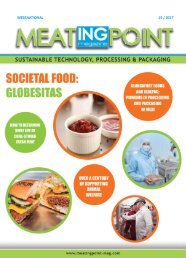MEATing POINT Magazine: #08/ 2016
Create successful ePaper yourself
Turn your PDF publications into a flip-book with our unique Google optimized e-Paper software.
TRENDS<br />
CLEAN<br />
LABEL?<br />
of consumers think non-GMO foods are<br />
inherently healthier.<br />
Breakout GMO Legislation<br />
Sales of non-GMO natural and organic<br />
foods are growing at a faster pace than sales<br />
of gluten free products (2011-<strong>2016</strong>). Even<br />
gluten free food sales are now cannibalised<br />
by the growth of organic food sales. There<br />
is an aggressive move by the large food<br />
retailers into natural and organic.<br />
Some individual US States are contemplating<br />
introducing their own breakout legislation,<br />
forcing the FDA/USDA to propose a<br />
voluntary non-GMO certification and<br />
labelling initiative.<br />
Pressure is building with the help of public<br />
initiatives to force governments –most<br />
notably in the US- to legislate mandatory<br />
GMO labelling. If governments do not<br />
take regulatory action, chances are that a<br />
patchwork of individual company-orchestrated<br />
food labels will be introduced that will be<br />
very confusing and far removed from a<br />
unified model.<br />
Both consumers an industry debates about<br />
foods that contain genetically modified<br />
ingredients are heating up. Products certified<br />
as containing no genetically modified<br />
organisms are proliferating and often without<br />
a clear and concise verification process.<br />
For the dairy industry, there is a strong link<br />
between GMO-free and organic marketing<br />
and often, dairy products can choose from<br />
either option.<br />
To confuse consumers even more, food<br />
companies are adding “non-GMO” words<br />
on products that would never be considered<br />
in need of such labelling. But what about<br />
companies that use GM-modulated enzymes<br />
in non-GM foods, including natural food and<br />
organic food? These (hidden) practices are<br />
clearly a huge topic for debate.<br />
But even if non-GMO products successfully<br />
pass the identity verification process, a non-<br />
GMO seal of approval can still inadvertently<br />
create confusion among consumers about<br />
the value and meaning of the organic<br />
seal. The organic seal is an assurance that<br />
food is grown without synthetic and toxic<br />
chemicals and is good for ecological and<br />
environmental parameters, in addition to<br />
being non-GMO. Most consumers do not<br />
know the differences between non-GMO<br />
and organic and this confusion is growing.<br />
Is Organic Sustainable for Healthy Diets?<br />
Developing in-house brands that consumers<br />
will perceive as authentic and healthier has<br />
been a major challenge for legacy food<br />
companies. The lack of entrepreneurial spirit<br />
is the main reason why most of these titans<br />
are forming venture capital offices with the<br />
aim to acquire promising start-ups. Legacy<br />
food companies can ill afford to sit on the<br />
sidelines as entrepreneurial-driven companies<br />
take market share for consumers seeking<br />
minimally processed “free from” clean label<br />
and environmentally sustainable foods.<br />
There is no doubt that organic food has<br />
become a lucrative business in affluent<br />
countries. For most food stores, organic<br />
produce and foods translate to premium<br />
profits. The organic food story has primarily<br />
become a professional marketing business, far<br />
removed from hippie initiators in the 1960s.<br />
Giant agricultural legacy food corporations<br />
such as Kraft, General Mills, Cargill, and<br />
ConAgra have now acquired many organic<br />
food companies. Anxiety is growing in some<br />
organic companies that corporate money<br />
will squeeze out the entrepreneurial spirit<br />
and reduce the essential values of their food.<br />
With these changes, the integrity of organic<br />
foods is increasingly coming under pressure.<br />
“Processed organic foods” in itself can<br />
be seen as a contradiction in terminus<br />
considering that additives and ingredients<br />
like, for example, carrageenan (a seaweed<br />
derivative) - classified as non-organic – can<br />
still be used in products that are certified<br />
organic.<br />
The number of organic farms and the<br />
market size for organic foods has steadily<br />
increased since 2000. Despite critics who<br />
dismiss organic agriculture as an inefficient<br />
approach to food security, organic foods will<br />
be of increasing importance in global food<br />
and eco-system security. Organic farming<br />
need better protection by government<br />
policies as well as financial funding to<br />
support increased research and breeding<br />
resources to allow wider adoption of organic<br />
agriculture.<br />
The current demand for organic foods is<br />
greater than the supply and is linked to<br />
36 www.meatingpoint-mag.com | <strong>2016</strong>


